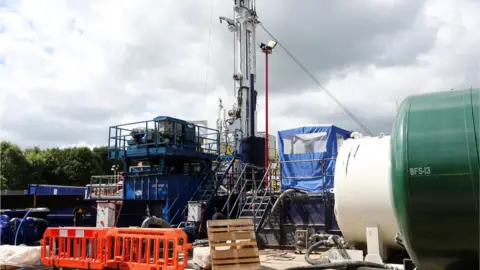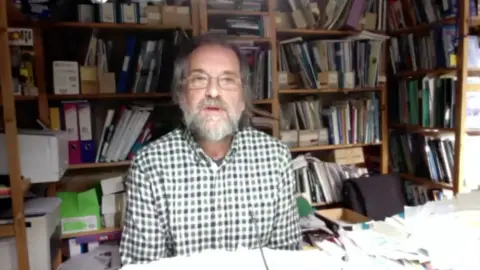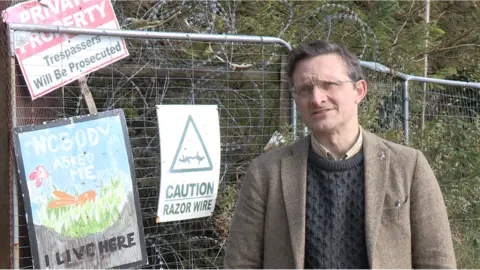Fracking: Tamboran to use 'conventional' drilling in shale gas search
 PA Media
PA MediaA petroleum exploration company has said it will use conventional horizontal drilling technology to search for shale gas if granted a licence in County Fermanagh.
Last week the economy minister said Tamboran Resources UK had removed the controversial practice of fracking from its application.
Diane Dodds said the revision would "remove the need for fracking".
The company wants to evaluate natural gas in the shale and sandstone rocks.
The firm, which is now under new ownership, last attempted to carry out test drilling in 2014, but faced community and political opposition.
A public consultation to Tamboran's fracking plan and a separate conventional exploration proposal resulted in 5,700 responses.
Fracking is a process in which liquid is pumped deep underground at high pressure to fracture shale rock and release gas or oil trapped within it.
Tamboran told BBC News NI that the revision to its licence application work programme has removed High Volume Hydraulic Fracturing (fracking) and replaced it with "conventional" horizontal drilling technology.
This would involve drilling down to a layer of sandstone which it believes contains gas, and then horizontally across the rock creating a larger surface area from which the gas could flow.
'Shale revolution'
"The improvement in horizontal drilling technology was the key driver in the so-called 'shale revolution' because it enables more contact with reservoir rock than vertical drilling," Tamboran said in a statement.
"Horizontal drilling has not been carried out in any of the 14 wells drilled in the basin to date.

"The company believes this conventional technology can potentially demonstrate natural gas will flow in commercial quantities."
Professor Stuart Haszeldine, a geologist at the University of Edinburgh School of GeoSciences, said a horizontal drill can extend for several kilometres, and while it was a conventional method "it's unusual and is more expensive".
"Drilling a horizontal hole enables you to contact more of the rock so you get a better investigation of the rock," he said.
"There have been multiple bore holes drilled in this region previously from the 1960s through to the 2000s and they all found that the gas is present, but none of the gas could be extracted commercially without fracking the rock.
"You have to wonder if drilling a horizontal hole and finding a bit more gas would then lead to a request about could we go in and frack that hole afterwards," Professor Haszeldine said.
He also points out that the legal definition of fracking in the UK is "unusual in global terms" as it refers to the volume of water put into the ground.
"If you put less than a certain volume of water and pump it up and break the rock, because you've put a small volume of water in then that's not defined legally in the UK as fracking."
'Not the future'
A cross-party motion at Stormont which called for an immediate end to licensing for oil and gas exploration was passed unanimously by assembly members.
The vote indicates that any future possibility of fracking is highly unlikely, but an outright ban in law would require a change in legislation.

Campaigners against fracking in County Fermanagh welcomed the vote and said it represented "a rejection of the kind of polluting industries of the past".
Councillor Donal O'Cofaigh, from Belcoo Frack Free said: "We don't want anything to do with Tamboran in this area - what they offer is not the future.
"We want green jobs, we want clean jobs but we don't want anything to do with putting more carbon into the atmosphere.
"We want to leave it in the ground and develop renewables."
Professor Haszeldine also said UK energy policy has moved on since licences for exploration were granted 10 years ago.
"The UK has now signed up to what is called net zero which is a plan to reduce carbon emissions systematically and comprehensively through to 2050 and so opening up a new source of high carbon energy being natural gas does not sit comfortably with that," he said.
Tamboran believes the usage of natural gas in Northern Ireland is set to rise with the completion of the Gas to the West project and the conversion of Kilroot power station from coal.
It said gas is currently imported from Scotland and a source in Northern Ireland would provide security to the supply and form a vital part of the energy infrastructure, bringing jobs and investment to the region.
Tamboran's new proposal is one of two licence applications currently being considered by the Department for the Economy.
Mrs Dodds also said she would continue to award a £75,000 contract for research into the implications of oil and gas exploration, using both conventional drilling and fracking.
Environmentalists had criticised the use of public money for the purpose.
